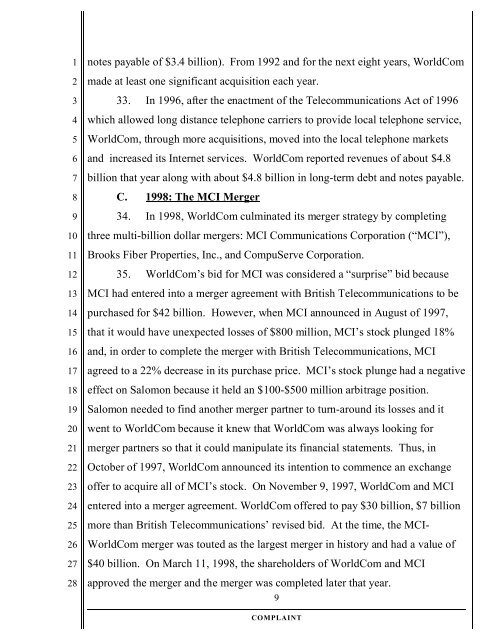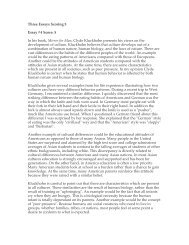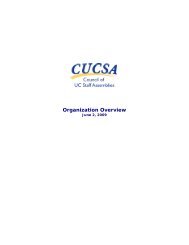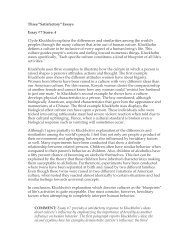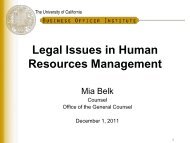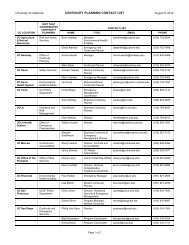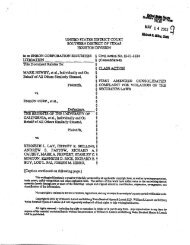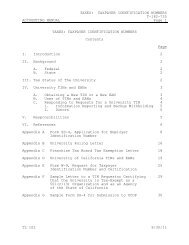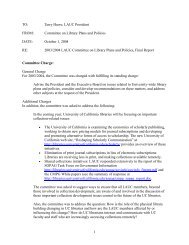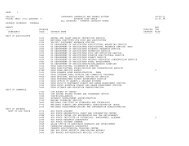The Regents - University of California | Office of The President
The Regents - University of California | Office of The President
The Regents - University of California | Office of The President
You also want an ePaper? Increase the reach of your titles
YUMPU automatically turns print PDFs into web optimized ePapers that Google loves.
1<br />
2<br />
3<br />
4<br />
5<br />
6<br />
7<br />
8<br />
9<br />
10<br />
11<br />
12<br />
13<br />
14<br />
15<br />
16<br />
17<br />
18<br />
19<br />
20<br />
21<br />
22<br />
23<br />
24<br />
25<br />
26<br />
27<br />
28<br />
notes payable <strong>of</strong> $3.4 billion). From 1992 and for the next eight years, WorldCom<br />
made at least one significant acquisition each year.<br />
33. In 1996, after the enactment <strong>of</strong> the Telecommunications Act <strong>of</strong> 1996<br />
which allowed long distance telephone carriers to provide local telephone service,<br />
WorldCom, through more acquisitions, moved into the local telephone markets<br />
and increased its Internet services. WorldCom reported revenues <strong>of</strong> about $4.8<br />
billion that year along with about $4.8 billion in long-term debt and notes payable.<br />
C. 1998: <strong>The</strong> MCI Merger<br />
34. In 1998, WorldCom culminated its merger strategy by completing<br />
three multi-billion dollar mergers: MCI Communications Corporation (“MCI”),<br />
Brooks Fiber Properties, Inc., and CompuServe Corporation.<br />
35. WorldCom’s bid for MCI was considered a “surprise” bid because<br />
MCI had entered into a merger agreement with British Telecommunications to be<br />
purchased for $42 billion. However, when MCI announced in August <strong>of</strong> 1997,<br />
that it would have unexpected losses <strong>of</strong> $800 million, MCI’s stock plunged 18%<br />
and, in order to complete the merger with British Telecommunications, MCI<br />
agreed to a 22% decrease in its purchase price. MCI’s stock plunge had a negative<br />
effect on Salomon because it held an $100-$500 million arbitrage position.<br />
Salomon needed to find another merger partner to turn-around its losses and it<br />
went to WorldCom because it knew that WorldCom was always looking for<br />
merger partners so that it could manipulate its financial statements. Thus, in<br />
October <strong>of</strong> 1997, WorldCom announced its intention to commence an exchange<br />
<strong>of</strong>fer to acquire all <strong>of</strong> MCI’s stock. On November 9, 1997, WorldCom and MCI<br />
entered into a merger agreement. WorldCom <strong>of</strong>fered to pay $30 billion, $7 billion<br />
more than British Telecommunications’ revised bid. At the time, the MCI-<br />
WorldCom merger was touted as the largest merger in history and had a value <strong>of</strong><br />
$40 billion. On March 11, 1998, the shareholders <strong>of</strong> WorldCom and MCI<br />
approved the merger and the merger was completed later that year.<br />
9<br />
COMPLAINT


